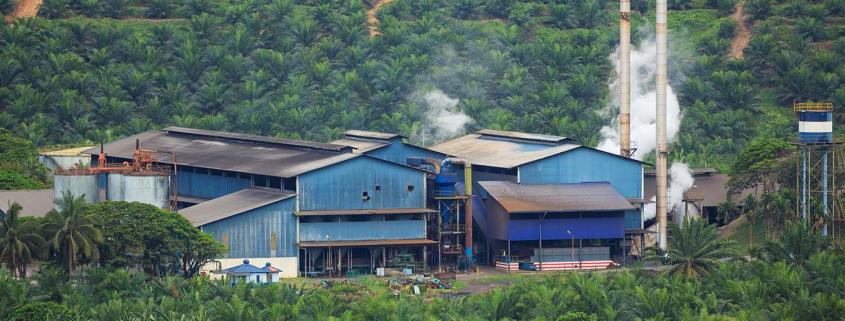ASEAN, EU collaboration needed to resolve palm oil dispute
Image: Palm oil mill in Sabah, Malaysia © CEphoto, Uwe Aranas
The failure to upgrade ties between the EU and ASEAN to a new strategic dialogue partnership at the 22nd ASEAN-EU Ministerial Meeting was another blemish on relations between the most institutionalized regional groupings of the developed and developing world.
The outcome of the talks, however, do not come as a surprise and reflect that the EU is more concerned with upgrading relations than ASEAN. ASEAN member states, meanwhile, are using the interregional negotiations to leverage national agendas.
While the EU and the majority of ASEAN member states were ready to conclude an agreement, Malaysia and Indonesia insisted the EU drop its plan to phase out the use of palm oil in biodiesels as stipulated under its Renewable Energy Directive.
The EU purports that its palm oil policy is a global policy. Nearly 90 percent of the world’s palm oil, however, comes from Southeast Asia, mostly from Indonesia and Malaysia. The commodity is one of Indonesia’s most important sources of export revenue, worth US$19 billion annually, and the EU is its second biggest export destination after India. Around half of the EU’s palm oil imports are used for biodiesel. The EU now claims the palm oil industry is responsible for deforestation, hence it is phasing out its use in biodiesels.
Given the importance of palm oil to the Indonesian and Malaysian economies, they have pushed a combative counter-narrative against the EU’s palm oil policy.
They have accused the EU of protectionism and discrimination, as the phasing out of palm oil will create demand for alternative vegetable oils more readily found in Europe, such as soybean or rapeseed oils.
Concurrently, they have appealed to the EU as a normative power that supposedly acts as a force for good by promoting the narrative that the palm oil industry supports the Sustainable Development Goals (SDGs).
“Refusing to use palm oil is the same as rejecting the SDGs,” Deputy Trade Minister AM Fachir said as reported by The Jakarta Post . Malaysian Foreign Minister Saifuddin Abdullah, meanwhile, told Bloomberg that Malaysia was preparing retaliatory measures. Saifuddin confirmed that palm oil was behind the impasse between the EU and ASEAN.
Significantly, upgrading interregional relations is more important for the EU, even if only in name.
The EU is looking to reinforce the importance of regionalism and interregional cooperation, given that Brexit and rising nationalism in EU member-states has dented its self-perception as a model for regional integration.
Upgrading relations would further anchor the EU in a geostrategic and economically important region. US President Donald Trump’s ‘America First’ Policy, as well as the trade war with China, has prompted the EU to promote the international rules-based system, a view that ASEAN shares.
ASEAN as an intergovernmental organization, however, takes a consensus-based approach. ASEAN member states thus appear to be using negotiations to leverage and amplify the national concerns of palm oil producers. It is unsurprising, therefore, that the issue of palm oil has derailed talks.
Foreign ministers still agree in principle on upgrading relations to a new strategic dialogue partnership but have said in a joint statement that it is “subject to details and timing to be worked out”.
Moving forward, the EU will rely on its recent experience in which threatening to close its market can lead to a change of behavior with external partners. This was evident with Thailand, the world’s third-largest exporter of seafood, which pushed through reforms to tackle illegal fishing after the EU stated that it would ban imports from the country.
Indeed, Indonesia and Malaysia are strengthening their sustainable palm oil certification systems. The Malaysian government has moved to ensure all palm estates are certified as sustainable by the end of this year, with special assistance extended for smallholders. On March 1, Malaysian Primary Industries Minister Teresa Kok said the country would halt the expansion of oil palm plantations to 6 million hectares in response to the negative campaign against palm oil and EU pressure.
Such high-pressure tactics, however, will only increase ASEAN member state’s perception that the EU is belittling toward them. The EU must communicate its palm oil policy more clearly, as it is evident that there are conflicting accounts of what the policy entails and what measures are required of palm oil producers to alleviate EU pressure.
Moreover, the palm oil issue between the EU and ASEAN member states has largely been played out at the top levels of government. To make further headway, there needs to be greater incorporation of lower levels of government, regulatory bodies, as well as smallholders and large estate representatives to ensure the impasse is dealt with holistically and collaboratively.
Achieving this will ensure that upgrading relations to a new strategic dialogue partnership will be more than just a public relations exercise, and a boost for regionalism and interregional cooperation at a time when it is sorely needed.
The writer is an emerging markets analyst and editor. Find him on Twitter @ShahSurajBharat.





Leave a Reply
Want to join the discussion?Feel free to contribute!